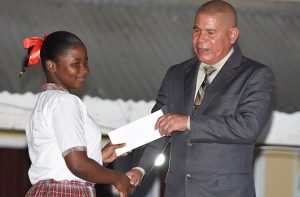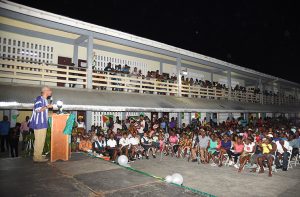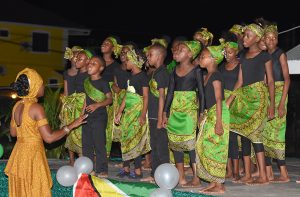– embrace education, agriculture and community
– President Granger urges in stirring Emancipation message
AFTER winning the fight for Emancipation from slavery many decades ago, President David Granger on the eve of Emancipation Day challenged Guyanese to strive for “economic emancipation” by making use of the approaching oil wealth.
The President was at the time speaking at Beterverwagting on Tuesday evening at a cultural evening organised by the Beterverwagting/Triumph 8th of May Movement to mark the 180th anniversary of the Abolition of Slavery.
Hundreds of Afro-Guyanese gathered in the compound and outskirts of the Beterverwagting Primary School to listen to the head of state’s wise advice on how they could build on the efforts of their predecessors.

The President told the residents that while their ancestors fought 180 years ago for their legal emancipation, today, each Guyanese must now fight for “economic emancipation.”
This, he said, includes making crime, poverty and disease “history” by building societies which possess a vision of the future, even as Guyana approaches immense oil wealth.
“This is the chance of a lifetime and you who are living today are witnessing the most transformative event in Guyana’s economic history, the coming of the petroleum industry. Don’t be sidelined, don’t be left behind, go to school, educate yourself, so you can prove to your grandchildren and future generations what your foreparents did for you,” he said.
The President continued: “It is towards economic emancipation that we must turn our efforts… there is, out there in the Atlantic, a powerful resource that belongs to all of us. It is not for foreigners, it’s not for strangers; it’s not for outsiders. It’s for you, your children and generations to come.”
GUYANA DEPENDS ON VILLAGES
In the village where Christians are in the majority, the President put forward the biblical ‘Parable of the Talents’ from the book of Matthew to make his petition clearer.
He likened the master in the parable to Guyana’s ancestors; his servants to present-day Guyanese; the talents given as village lands, farmlands, schools and more and the Kingdom, he likened to the “good life.”
“If you waste your talents, it will be taken away from you. If you don’t make use of the talents that your forefathers gave to you, you will be poor. They did not intend for you to be poor and destitute, they intended that you should never be slaves again,” the President remarked.

Later, he said: “What I ask you tonight is to think not about 180 years ago, but about the next 10 or 18 years when that mighty Atlantic starts to generate wealth for Guyana. I can do everything possible to make sure that the profits and benefits are equitable shares. But you, and your children, your sons and daughters, must be educated and must be empowered to make use of that new ‘talent’.”
He relayed a candid message to the community that unproductive actions will not advance their community as villages in Guyana have, and always will, depend on the four pillars of the home, church, school and farm for prosperity.
“Our lives will be determined by how we make our living. If we make our living by hanging around the corner, liming by the Guinness bar, we will be forever poor. But if we go into our farms, go into our workshops, into our schools, we’ll be able to have prosperity,” he advised.
He added: “Most Guyanese live in villages, up to now, they come from villages. Most agriculture produce comes from the villages, without the villages we’d starve. My brothers and sisters, we must not allow our villages to degenerate into dormitories where every morning we catch the minibus and clear out [to the major towns] and every evening we come home to sleep. If that continues to happen, the village economy will shrivel.”
BE BETTER, DO BETTER
Instead, he encouraged the attending residents to venture into self-employment through agro-processing and growing and selling their own produce.
Even as several children from the village were honoured for their exceptional performance at the recent National Grade Six Assessment (NGSA) examinations, the head of state took the opportunity to urge the scores of parents present to ensure that every child in their village goes to school.

He made this call, noting that the government will also continue to do its part to push for the same with its Boats, Buses and Bicycles initiative.
“We have to put an end to ignorance. Not just the village movement, I want the whole village to embrace the need for education,” he said.
At the function, where several cultural presentations came in the forms of dance, singing, poetry and drumming, the President said that every family must have a copy of the history of their village.
As such, he committed to funding such an initiative should the village leaders show interest.
“I would like to commit to the leaders, the members of the committee who organised this celebration, if you can put together the history of Beterverwagting I would pay to reprint that history, so that the little children in this village can have it,” he said.
Beterverwagting, a Dutch name meaning ‘better expectation’, is one of the oldest villages in Guyana which was purchased in 1838 by 61 emancipated Africans.



.jpg)









